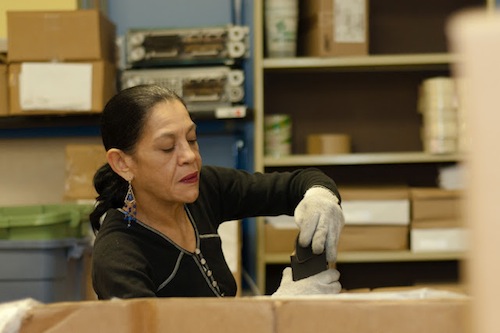


Growth in contract labor jobs can provide access to training programs that help people with disabilities assess other career paths. (Photo courtesy of Paige Connors, American Training, Inc.)
Frito-Lay, International Paper, and Bates-Troy are just three of about 15-20 companies benefiting from contract labor services provided by people with disabilities, according to a report filed last week by WBNG Channel 12 Action News reporter Matt Markham.
Markham talks to Mary Jo Thorn, an official from the contract services provider, who says that her organization has been able to take on new accounts and hire 80 additional people with disabilities because of their track record of success:
‘Our workers, for a number of years consecutively, were awarded co-packer of the year award because of the quality of their work, and because there was no foreign matter discovered in any of our products,’ Thorn said.
WBNG provides accompanying video to the online story showing people with disabilities performing manual labor duties like sorting, packing, and assembly. Markham makes the point that this is an example of successfully outsourcing to Americans instead of moving jobs offshore.
Thorn also says their contract labor service is looking to add another location beyond the four it already has and hire additional personnel to their current workforce of 350 employees. In turn, the opportunity to hire more people with disabilities can lead to providing more career training opportunities for individuals to transition into other employment situations.
The state of Ohio will be adopting this model going forward following a new executive order by Governor John Kasich, which for the first time connects state agencies with schools to provide such opportunities. In his story for the Stow Sentry, Capital Bureau Chief Marc Kovac quotes the governor as saying this measure will help people with disabilities by giving them not just more job opportunities, but tools to evaluate which opportunities will work best for their individual circumstances:
We have people with developmental disabilities who we’ve got to stand up for who can be placed in a setting where they’re going to get even more self confidence, where they’re going to feel better about everything they do.
Kovac also speaks with Sue Hetick, the mother of a 23-year-old man with disabilities named Micah, who took part in the executive order signing ceremony. Hetick says her son is a good example of an individual who has benefited from state programs, pointing out that “using his own money has reduced his reliance on Social Security.”
Whether it’s a career training program or a contract labor opportunity, options are what makes life matter for people with disabilities and keep jobs that traditionally have been outsourced in the skilled hands of Americans.
Comments?